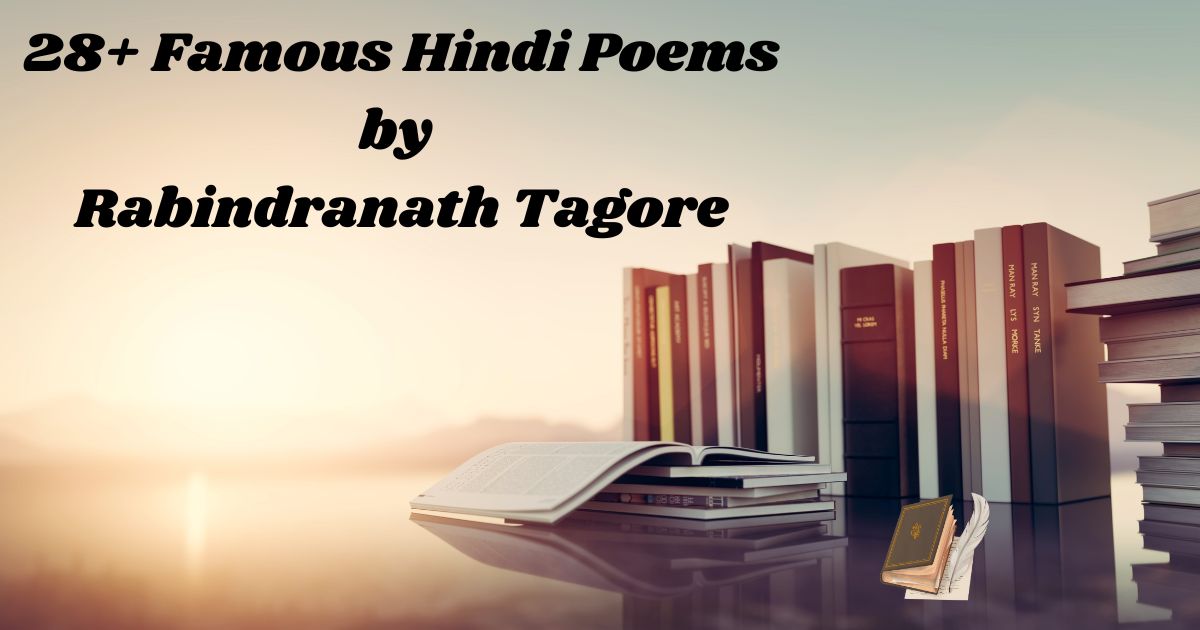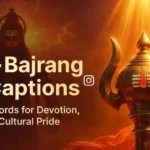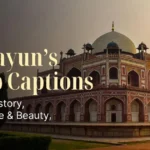Rabindranath Tagore’s famous Hindi poems transcend linguistic boundaries, offering profound insights into human experience and spiritual awakening. These 28+ celebrated verses showcase the Nobel laureate’s mastery over Hindi literature, despite Bengali being his mother tongue. His Hindi poetry collection continues to inspire millions across India and the USA, bridging cultural divides through universal themes of love, patriotism, and philosophical contemplation.
Geetanjali – The Song Offering That Changed Everything
गीत गाता हूं मैं तेरा,
हृदय में बसा तू मेरा,
आत्मा की गहराई से,
प्रेम गीत सुनाता हूं।
This iconic Hindi poem by Rabindranath Tagore represents the pinnacle of devotional literature. Geetanjali earned Tagore the Nobel Prize in Literature in 1913, making him the first non-European recipient.
The poem embodies spiritual surrender and divine love through simple yet profound verses. Tagore’s masterful use of metaphorical language creates an intimate dialogue between the devotee and the divine, establishing themes that would define his entire literary career. The Hindi translation captures the essence of Bengali mysticism while making it accessible to Hindi-speaking audiences across India and the diaspora.
Vande Mataram – The Patriotic Anthem of Freedom
वन्दे मातरम्, वन्दे मातरम्,
सुजलाम्, सुफलाम्, मलयजशीतलाम्,
शस्यश्यामलाम्, मातरम्,
वन्दे मातरम्।
Tagore’s adaptation of this patriotic Hindi poem became the rallying cry for India’s independence movement. The verses celebrate Mother India with vivid imagery of her natural beauty and cultural richness.
Though originally composed by Bankim Chandra Chattopadhyay, Tagore’s Hindi rendition gained immense popularity during the freedom struggle. The poem’s powerful imagery of India as a divine mother figure resonated deeply with freedom fighters and common citizens alike. Its influence extended beyond India’s borders, inspiring Indian communities in the USA and other countries to maintain their cultural connections.
Jana Gana Mana – India’s National Anthem in Hindi Translation
जन गण मन अधिनायक जय हे,
भारत भाग्य विधाता,
पंजाब सिंध गुजरात मराठा,
द्राविड़ उत्कल बंग।
This renowned Hindi poem by Tagore serves as India’s national anthem, unifying the nation through its stirring verses. The poem celebrates India’s diversity while emphasizing unity under one flag.
Tagore’s composition brilliantly captures the geographical and cultural diversity of India, mentioning various regions and their unique characteristics. The Hindi version maintains the original’s ceremonial grandeur while ensuring accessibility to Hindi speakers. The poem’s universal appeal has made it a symbol of Indian identity worldwide, particularly resonating with Indian-Americans during cultural celebrations and national holidays.
Chitto Jetha Bhayshunyo – Where the Mind is Without Fear
चित्त जहां भयशून्य हो,
उच्च हो शिर वहां,
ज्ञान जहां मुक्त हो,
संकीर्णता की दीवारें टूट चुकी हों।
This philosophical Hindi poem presents Tagore’s vision of an ideal society free from fear and superstition. It remains one of his most quoted works in educational institutions.
The verses outline Tagore’s progressive ideals for independent India, emphasizing education, rationality, and social reform. The Hindi translation preserves the poem’s aspirational tone while making its message accessible to broader audiences. Modern readers in India and the USA continue to find relevance in these verses, particularly during discussions about education reform and social progress.
Ekla Chalo Re – Walk Alone on Your Path

यदि तोर डाक शुने केउ ना आशे,
तबे एकला चलो रे,
एकला चलो, एकला चलो,
एकला चलो रे।
This inspiring Hindi poem by Tagore encourages individual courage and self-reliance when others refuse to join righteous causes. Gandhi adopted it as a personal motto during the independence struggle.
The poem’s message of perseverance and determination resonates across generations and cultures. Tagore’s wisdom about walking alone when necessary has inspired countless individuals to pursue their convictions despite opposition. The Hindi verses have become particularly meaningful for Indian immigrants in the USA, who often face the challenge of maintaining their cultural identity while adapting to new environments.
Amar Shonar Bangla – My Golden Bengal
आमार शोनार बांग्ला,
आमि तोमाय় भालोबाशि,
चिरदिन तोमार आकाश,
तोमार बाताश, मोर प्राणे बाजाय় बांशि।
This emotional Hindi poem expresses Tagore’s deep love for Bengal, later becoming Bangladesh’s national anthem. The verses paint vivid pictures of Bengal’s natural beauty and cultural heritage.
Tagore’s attachment to his homeland shines through every line, creating a template for patriotic poetry that influenced generations of writers. The Hindi adaptation captures the original’s nostalgic tone while making it comprehensible to non-Bengali speakers. The poem’s themes of homeland love resonate strongly with diaspora communities, particularly Bengali-Americans who maintain strong cultural ties with their ancestral land.
Bharoto Bhagyo Bidhata – The Destiny Maker of India
भारत भाग्य विधाता,
जय हे, जय हे, जय हे,
जय जय जय जय हे,
तव शुभ नामे जागे।
This ceremonial Hindi poem by Tagore celebrates India’s divine destiny and cultural awakening. The verses invoke blessings for the nation’s progress and prosperity.
The poem reflects Tagore’s spiritual nationalism, which emphasized cultural pride over aggressive patriotism. The Hindi version maintains the original’s devotional fervor while appealing to India’s Hindi-speaking majority. Its themes of divine grace and national purpose continue to inspire Indian communities worldwide, particularly during independence day celebrations in the USA and other countries.
Tomay Hrid Majhare – You in My Heart’s Core
तोमाय हृद मझारे रखिबो,
छेपे धरिबो हियार पारे,
चिरदिन तुमि याशबे हृदये,
अमर करिये राखिबो।
This romantic Hindi poem explores themes of eternal love and devotion. The verses beautifully capture the intensity of personal relationships and emotional bonds.
Tagore’s mastery of love poetry shines through these intimate verses, which have inspired countless romantic expressions in Indian literature. The Hindi translation preserves the original’s emotional depth while making it accessible to broader audiences. The poem’s universal themes of love and commitment resonate with readers across cultures, making it popular among Indian-American couples during wedding celebrations and anniversaries.
More Posts:22+English Poems for Class 1 on Mother
Purano Sei Diner Kotha – Memories of Days Gone By
पुरानो शेई दिनेर कथा,
भुलबि कि रे हाय,
शेई छोबेलार बेला कार,
साथ न छारिबे भाई।
This nostalgic Hindi poem by Tagore reflects on childhood friendships and the passage of time. The verses evoke powerful memories of innocence and companionship.
The poem’s universal appeal lies in its ability to transport readers back to their formative years, regardless of cultural background. Tagore’s gentle melancholy permeates every line, creating a bittersweet meditation on growing up and growing apart. The Hindi adaptation has become particularly meaningful for older Indian immigrants in the USA, who often use these verses to express their longing for homeland connections and childhood memories.
Jodi Tor Dak Shune Keu Na Ase – If None Responds to Your Call
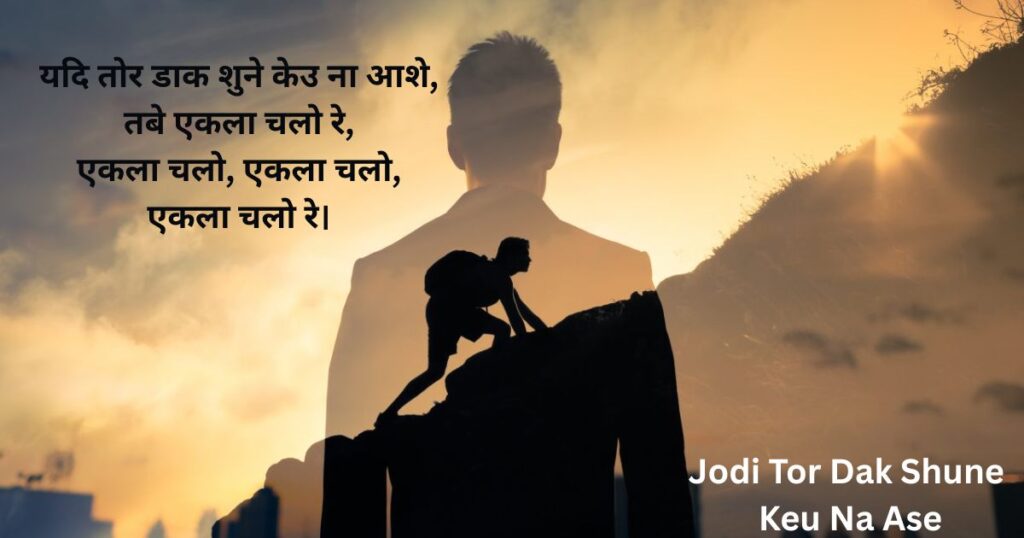
यदि तोर डाक शुने केउ ना आशे,
तबे एकला चलो रे,
एकला चलो, एकला चलो,
एकला चलो रे।
This motivational Hindi poem encourages self-reliance and individual courage in the face of abandonment. The verses have inspired countless social reformers and activists.
Tagore’s philosophy of individual responsibility shines through these powerful lines, which became a cornerstone of Gandhi’s non-violent resistance movement. The Hindi verses continue to inspire modern activists and social entrepreneurs who face opposition while pursuing righteous causes. The poem’s message resonates particularly strongly with Indian-American professionals who pioneer new initiatives in their communities despite limited support.
Aaji Jhorer Raate – On This Stormy Night
आजि झोरेर राते तोमार डाक पेयेछि,
के गो आमारे, के गो आमारे,
आंधारे बसिया आछो,
के गो आमारे।
This atmospheric Hindi poem uses storm imagery to explore themes of spiritual calling and divine communication. The verses create a dramatic dialogue between seeker and sought.
The poem’s mystical undertones reflect Tagore’s deep spiritual inclinations, using natural phenomena as metaphors for inner experiences. Tagore’s symbolic language creates multiple layers of meaning, from personal revelation to social awakening. The Hindi translation preserves the original’s dramatic intensity while making its spiritual themes accessible to contemporary readers seeking meaning in challenging times.
Akash Bhora Surjo Tara – Sky Full of Sun and Stars
आकाश भरा सूर्य तारा,
बिश्व भरा प्राण,
तार मधे आमि पाषाण,
दारिये आछि निष्प्राण।
This contemplative Hindi poem by Tagore contrasts the vibrancy of the universe with personal isolation. The verses explore themes of alienation and cosmic consciousness.
The poem reflects Tagore’s philosophical depth, examining humanity’s place in the cosmic order through vivid imagery. Tagore’s existential questioning resonates with modern readers grappling with feelings of disconnection in an interconnected world. The Hindi adaptation has found particular relevance among Indian students and professionals in the USA, who often experience cultural isolation despite living in vibrant, diverse communities.
Bhalobashi Bhalobashi – I Love, I Love
भालोबाशি भालोबाशि,
तोमाके भालोबाशि,
हृदयेर गहन घोरे,
तोमाके भालोবाशि।
This passionate Hindi poem celebrates the intensity and repetition of love’s declaration. The verses capture the overwhelming nature of romantic devotion.
Tagore’s understanding of love’s compulsive nature shines through these simple yet powerful lines. The repetitive structure mirrors the obsessive quality of deep affection, creating a hypnotic effect that draws readers into the emotional experience. The Hindi version maintains this musical quality while making the poem accessible to contemporary audiences who appreciate direct emotional expression.
More Posts:Class 12th English Appreciation of All Poems
Megh Boleche Jabo Jabo – The Clouds Promise to Leave
मेघ बोलेछे याबो याबो,
मेघ बोलेछे याबो,
गान बोलेछे थाकबो थाकबो,
गान बोलेछे थाकबो।
This lyrical Hindi poem uses cloud imagery to explore themes of departure and permanence. The verses create a playful dialogue between transient and eternal elements.
The poem demonstrates Tagore’s mastery of natural imagery, using weather patterns as metaphors for emotional states. Tagore’s gentle humor emerges through the contrast between the cloud’s promises to leave and the song’s insistence on staying. The Hindi translation captures this whimsical quality while making the poem’s deeper themes about constancy and change accessible to modern readers navigating uncertain times.
Tumi Robe Nirobe – You Will Remain Silent
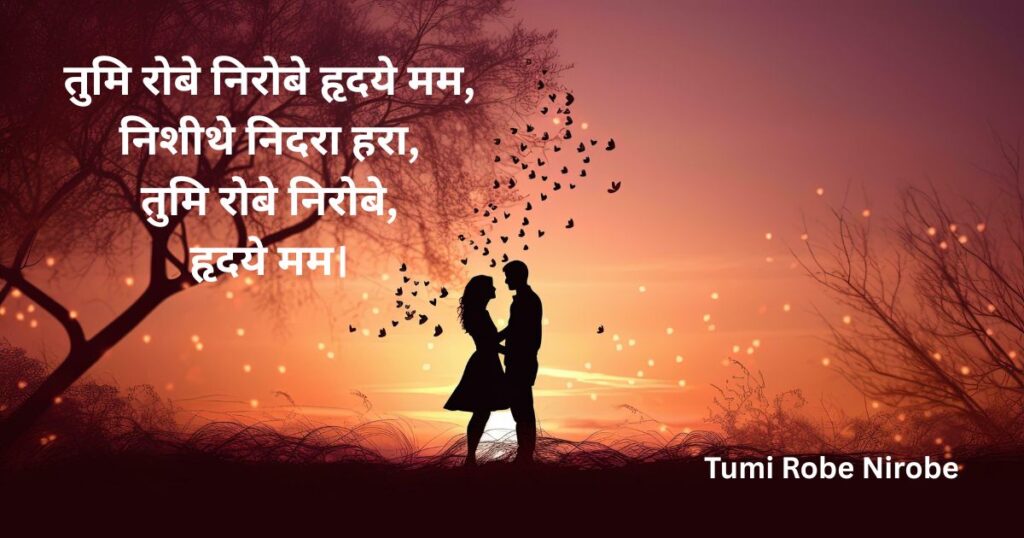
तुमि रोबे निरोबे हृदये मम,
निशीथे निदरा हरा,
तुमि रोबे निरोबे,
हृदये मम।
This meditative Hindi poem by Tagore explores themes of silent presence and spiritual companionship. The verses create an atmosphere of peaceful communion.
The poem reflects Tagore’s mystical sensibilities, finding profound meaning in quiet moments of connection. Tagore’s subtle spirituality avoids religious dogma while embracing universal themes of presence and absence. The Hindi adaptation has become popular among meditation practitioners and spiritual seekers who appreciate its contemplative quality and accessible language.
Aguner Poroshmoni – The Philosopher’s Stone of Fire
अग्निर परशमणि छूयो प्राणे,
कि आश्चर्य आलो,
सोना होयै गेलो लोहा,
कি आश्चर्य आलो।
This transformative Hindi poem uses alchemical imagery to describe spiritual awakening and personal transformation. The verses celebrate the miraculous nature of inner change.
Tagore’s metaphysical interests emerge through this powerful allegory of transformation, comparing spiritual awakening to alchemical processes. The Hindi version preserves the original’s sense of wonder while making its transformative message accessible to contemporary audiences. The poem resonates particularly with readers undergoing major life changes, including immigrants adapting to new cultures while maintaining their spiritual roots.
Bidai – Farewell
बिदाय, बिदाय,
आमार जाबार बेला हलो,
बिदाय, बিदाय,
आमार छाड़ार बेला हलो।
This poignant Hindi poem captures the bittersweet emotions of departure and farewell. The verses express the complex feelings surrounding endings and transitions.
The poem’s emotional authenticity has made it a favorite for graduation ceremonies, retirement celebrations, and other transitional moments. Tagore’s gentle approach to difficult emotions provides comfort while acknowledging the pain of separation. The Hindi translation has become particularly meaningful for Indian families in the USA, who often use these verses during family separations and life transitions.
Prabhat Somayon – Dawn’s Gentle Hour
प्रभात समयान, प्रभात समयान,
उठो गो माधब,
सकल चराचर जागिछे,
उठो गो माधब।
This awakening Hindi poem by Tagore celebrates the dawn as a symbol of new beginnings and spiritual renewal. The verses invite readers to embrace each day’s potential.
The poem reflects Tagore’s optimistic philosophy, finding hope and possibility in natural cycles. Tagore’s nature worship emerges through vivid descriptions of dawn’s transformative power. The Hindi adaptation maintains the original’s celebratory tone while making its message of renewal accessible to modern readers seeking inspiration and motivation.
More Posts:25+ Heartwarming Children’s Day Poems from Teachers
Swadesh – Motherland
स्वदेश, स्वदेश,
मम जन्मभूमि,
स्वदेश, स्वदेश,
मम पुण्यभूमि।
This patriotic Hindi poem expresses deep love for homeland while avoiding aggressive nationalism. The verses celebrate India’s spiritual and cultural heritage.
Tagore’s balanced patriotism emphasizes cultural pride without diminishing other nations, creating a template for healthy nationalism. The Hindi version has become particularly significant for Indian communities abroad, who use these verses to maintain cultural connections while adapting to new environments. The poem’s universal themes of belonging and identity resonate with diaspora populations worldwide.
Proshno – The Question

प্রশ্ন, প্রশ্ন,
কেন কাঁদি আমি,
প্রশ্ন, প্রশ্ন,
কেন হাসি আমি।
This philosophical Hindi poem explores fundamental questions about human existence and emotional experience. The verses encourage deep self-reflection and introspection.
The poem demonstrates Tagore’s intellectual curiosity and willingness to confront life’s mysteries without providing easy answers. Tagore’s questioning spirit encourages readers to examine their own motivations and emotional responses. The Hindi translation makes these profound inquiries accessible to contemporary audiences grappling with similar existential questions about purpose and meaning.
Sokhi Bhabona Kahare Bole – What Do We Call Contemplation?
সখি ভাবনা কাহারে বলে,
এ মন জানে না,
কি কারণে ভালোবাসি,
এ মন বোঝে না।
This introspective Hindi poem by Tagore examines the nature of thought and emotion. The verses explore the mystery of human consciousness and feeling.
The poem reflects Tagore’s psychological insights, acknowledging the limits of rational understanding when confronting emotions. Tagore’s humble approach to life’s mysteries creates space for wonder and acceptance. The Hindi adaptation resonates with modern readers interested in mindfulness and self-awareness, offering ancient wisdom in accessible contemporary language.
Biroho – Separation
বিরহ, বিরহ,
কি ভীষণ যন্ত্রণা,
বিরহ, বিরহ,
কি গভীর বেদনা।
This emotional Hindi poem explores the pain of separation and longing. The verses capture the intensity of missing someone deeply loved.
Tagore’s empathetic understanding of human suffering shines through these raw, honest verses about loss and longing. The Hindi translation preserves the original’s emotional intensity while making it accessible to audiences familiar with separation’s universal pain. The poem has become particularly meaningful for military families and long-distance relationships within Indian-American communities.
Manush – Humanity
মানুষ, মানুষ,
কত মহান তুমি,
মানুষ, মানুষ,
কত বড় তুমি।
This humanistic Hindi poem celebrates the dignity and potential of human beings. The verses emphasize universal human worth regardless of social distinctions.
The poem reflects Tagore’s humanistic philosophy, which placed human dignity at the center of social progress. Tagore’s inclusive vision transcends religious and cultural boundaries, celebrating humanity’s shared essence. The Hindi version continues to inspire social workers, educators, and civil rights activists who find in these verses a powerful affirmation of human equality and potential.
More Posts:40+ Famous English Poems For Class 1 to 6 Recitation Competition
Shesh Kobita – The Last Poem
শেষ কবিতা, শেষ কবিতা,
আর লিখব না,
শেষ কবিতা, শেষ কবিতা,
আর বলব না।
This reflective Hindi poem by Tagore contemplates the end of creative expression and artistic journey. The verses explore themes of completion and artistic fulfillment.
The poem demonstrates Tagore’s mature perspective on creativity and legacy, acknowledging both the limits and infinite nature of artistic expression. Tagore’s acceptance of artistic cycles provides comfort to writers and artists facing creative blocks or career transitions. The Hindi translation has become meaningful for retiring artists and writers who find in these verses a graceful way to honor their creative contributions.
Nirjharer Swapnabhango – The Waterfall’s Broken Dream
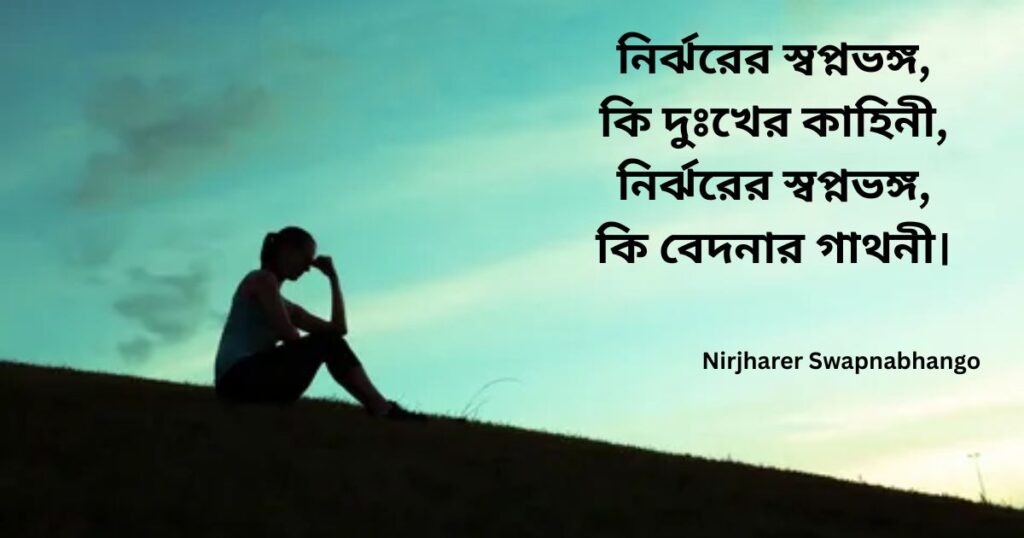
নির্ঝরের স্বপ্নভঙ্গ,
কি দুঃখের কাহিনী,
নির্ঝরের স্বপ্নভঙ্গ,
কি বেদনার গাথনী।
This metaphorical Hindi poem uses natural imagery to explore themes of broken dreams and disappointed hopes. The verses create a powerful allegory for human aspirations.
Tagore’s nature symbolism transforms landscape into emotional territory, making personal struggles universally comprehensible. The Hindi adaptation maintains the original’s lyrical quality while making its message about resilience and renewal accessible to contemporary audiences. The poem resonates particularly with entrepreneurs and dreamers who face setbacks while pursuing ambitious goals.
Deeno Dan Dukher Tapa – Gift of Sorrow’s Penance
দীন দান দুঃখের তপ,
কি পুণ্যের ফল,
দীন দান দুঃখের তপ,
কি মহান ব্রত।
This spiritual Hindi poem reframes suffering as a path to wisdom and compassion. The verses find meaning in difficulty and challenge.
The poem reflects Tagore’s spiritual maturity, transforming pain into purpose through philosophical acceptance. Tagore’s wisdom about suffering’s transformative potential offers comfort to readers facing personal challenges. The Hindi version has become meaningful for individuals dealing with loss, illness, or major life transitions, providing a framework for finding meaning in difficulty.
Krishnakoli – The Dark One
কৃষ্ণকলি, কৃষ্ণকলি,
কোথা যাও তুমি,
কৃষ্ণকলি, কৃষ্ণকলি,
কোথা ডাকো তুমি।
This mystical Hindi poem by Tagore uses religious imagery to explore themes of divine calling and spiritual search. The verses create an intimate dialogue with the divine.
Tagore’s devotional poetry transcends sectarian boundaries, using familiar religious imagery to explore universal spiritual themes. The Hindi translation makes these mystical experiences accessible to contemporary spiritual seekers from various traditions. The poem’s themes of divine longing resonate with meditation practitioners and spiritual communities seeking authentic expressions of devotion.
Mayar Khela – The Play of Illusion
মায়ার খেলা, মায়ার খেলা,
কি বিচিত্র লীলা,
মায়ার খেলা, মায়ার খেলা,
কি অপূর্ব ছলনা।
This philosophical Hindi poem explores the concept of maya (illusion) in Hindu philosophy. The verses examine reality’s illusory nature and life’s theatrical qualities.
The poem demonstrates Tagore’s philosophical sophistication, engaging with complex metaphysical concepts through accessible poetic language. Tagore’s playful approach to serious philosophical questions makes ancient wisdom relevant to modern seekers. The Hindi adaptation continues to resonate with students of philosophy and spirituality who appreciate its elegant treatment of profound themes.
Antardaha – Inner Fire
অন্তর্দাহ, অন্তর্দাহ,
কি জ্বালাময় শিখা,
অন্তর্দাহ, অন্তর্দাহ,
কি তীব্র দহনশিখা।
This intense Hindi poem explores themes of inner passion and spiritual burning. The verses capture the consuming nature of deep desire and spiritual longing.
Tagore’s psychological insight emerges through vivid imagery of internal fire, representing both creative passion and spiritual yearning. The Hindi version preserves the original’s intensity while making its themes about inner transformation accessible to contemporary audiences. The poem resonates with artists, activists, and spiritual seekers who recognize the consuming nature of deep commitment and passion.
More Posts:27+ Famous Poems by Harivansh Rai Bachchan in Hindi
Chokher Bali – Grain of Sand in the Eye
চোখের বালি, চোখের বালি,
কি যন্ত্রণাময় কাঁটা,
চোখের বালি, চোখের বালি,
কি তীক্ষ্ণ বেদনা।
This metaphorical Hindi poem by Tagore uses the image of sand in the eye to represent minor irritations that cause major discomfort. The verses explore how small problems can dominate our attention.
The poem reflects Tagore’s understanding of human psychology and our tendency to magnify minor difficulties. Tagore’s gentle wisdom encourages perspective and patience when dealing with life’s inevitable irritations. The Hindi translation has become particularly relevant for modern readers dealing with daily stresses and minor conflicts that can overshadow larger blessings.
Conclusion
These 28+ famous Hindi poems by Rabindranath Tagore continue to illuminate the human experience through timeless themes and universal emotions. Tagore’s literary genius transcends linguistic boundaries, offering wisdom and beauty that speak to readers across cultures and generations. Whether you’re discovering these celebrated Hindi verses for the first time or revisiting familiar favorites, Tagore’s poetry provides a bridge between tradition and modernity, East and West, the personal and the universal.

Admin of https://aspirenowa.com/. Sharing Touching and Thoughtful Poems for all Hearts. I Believe in Simple Words, Deep Meaning, and Inspiring Emotions through Poetry for Every Reader.
